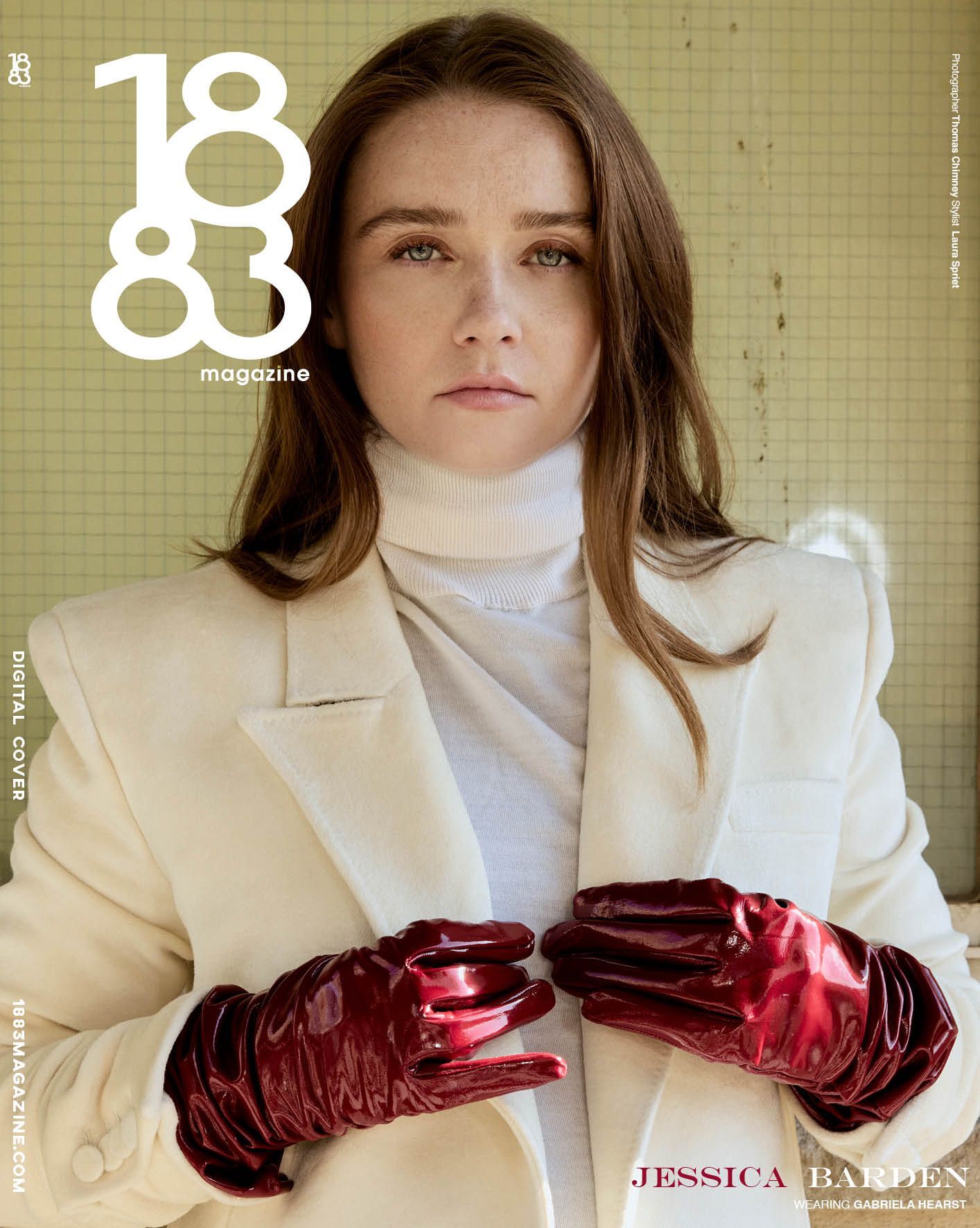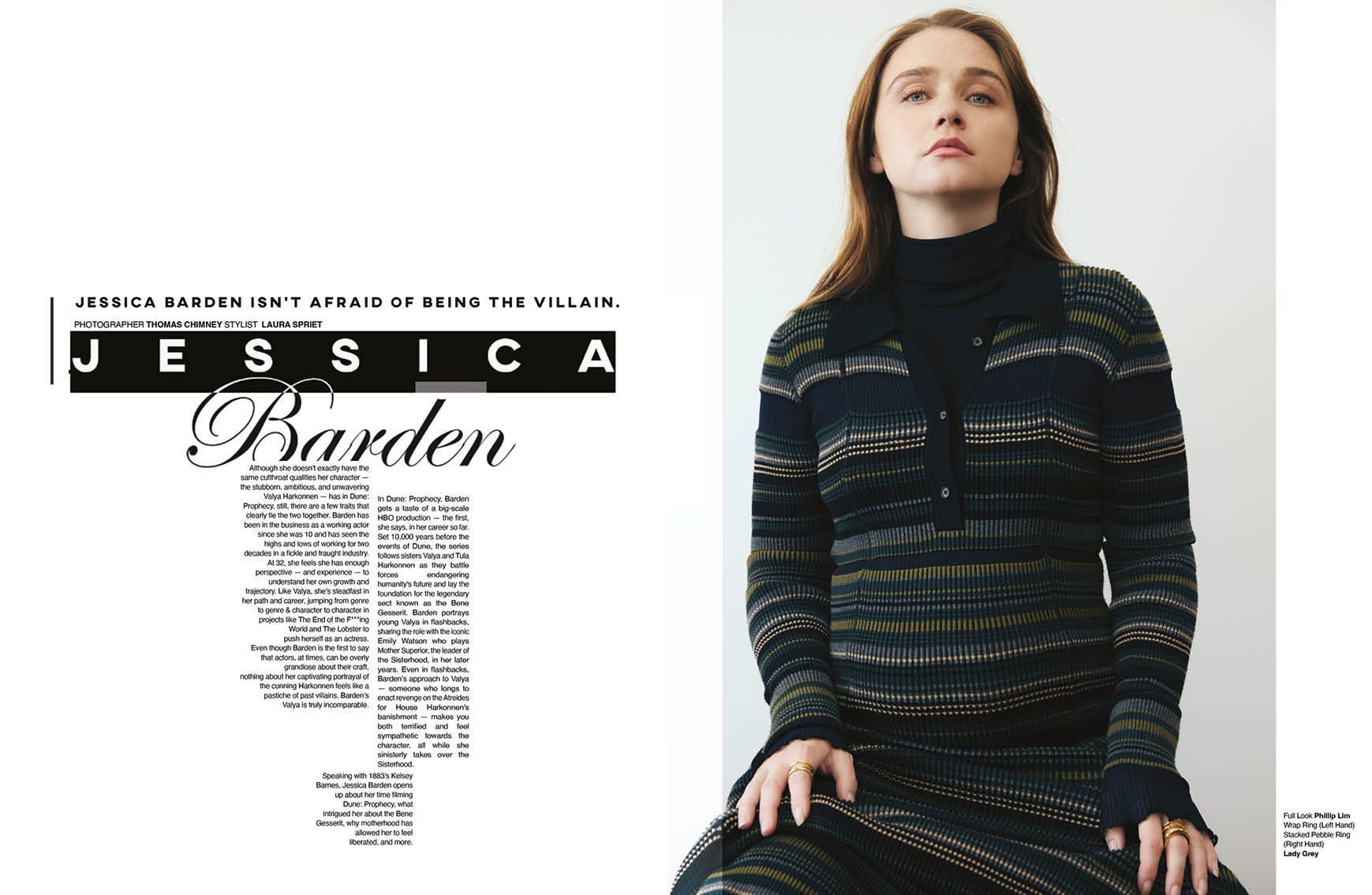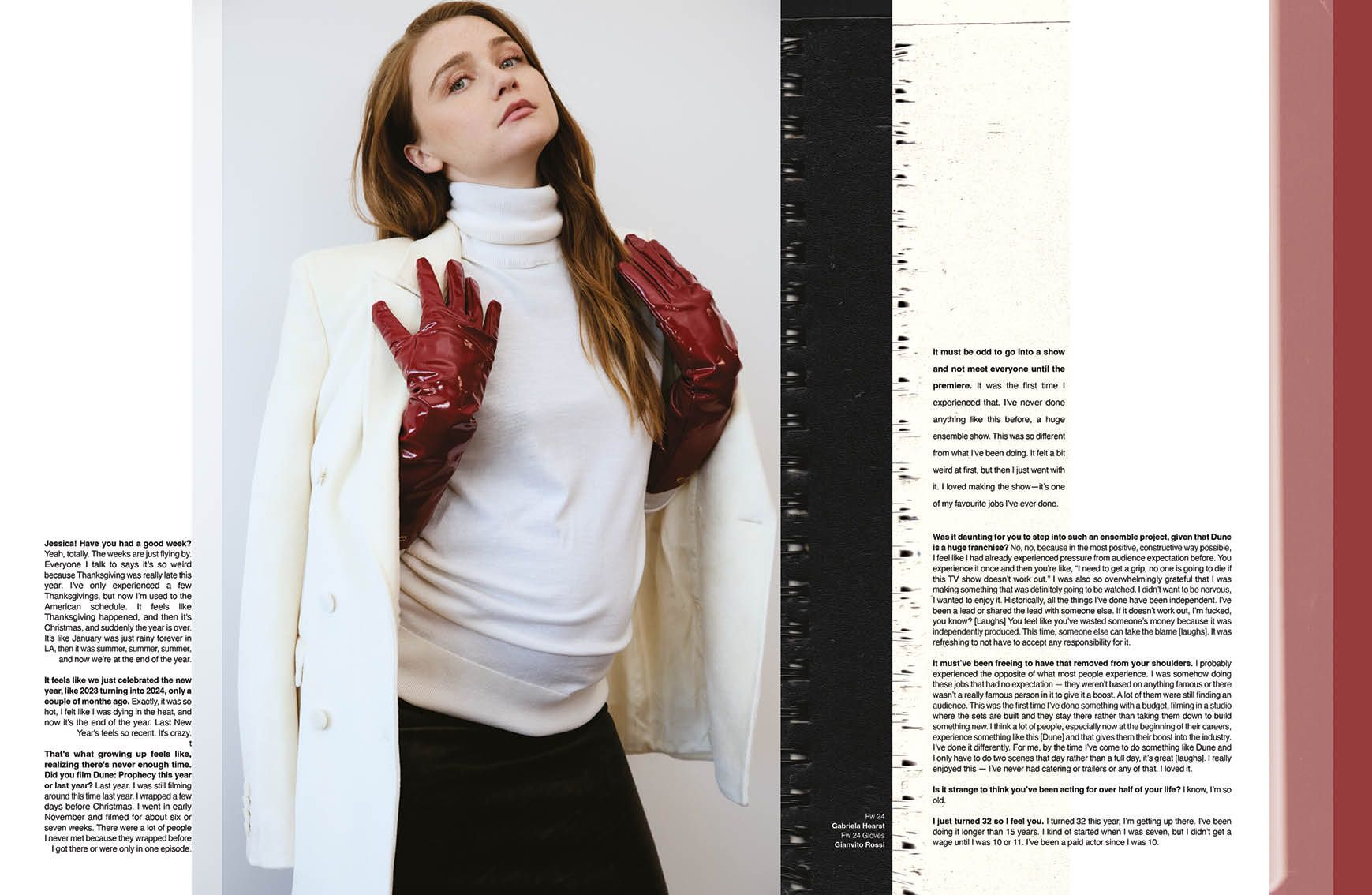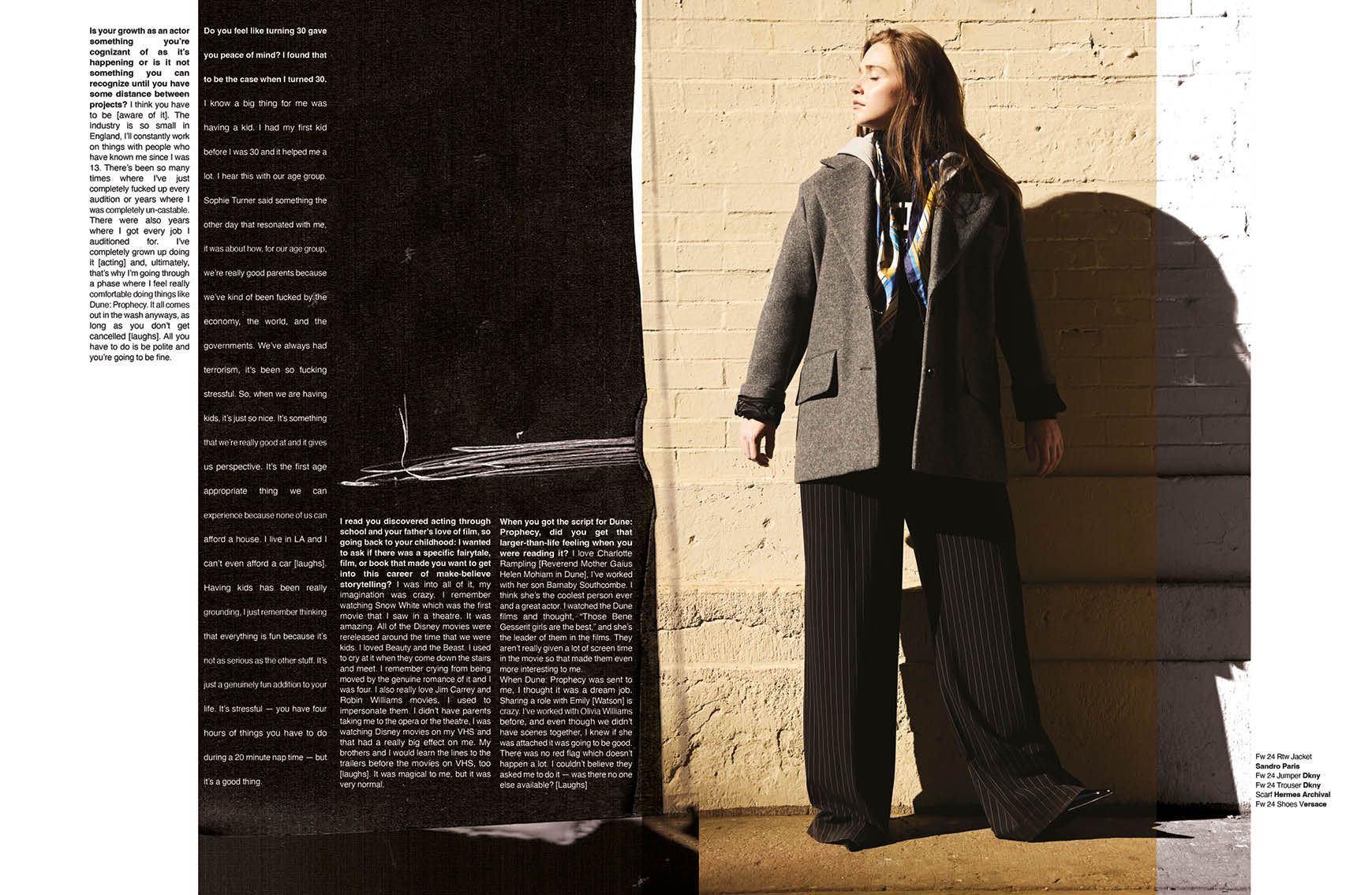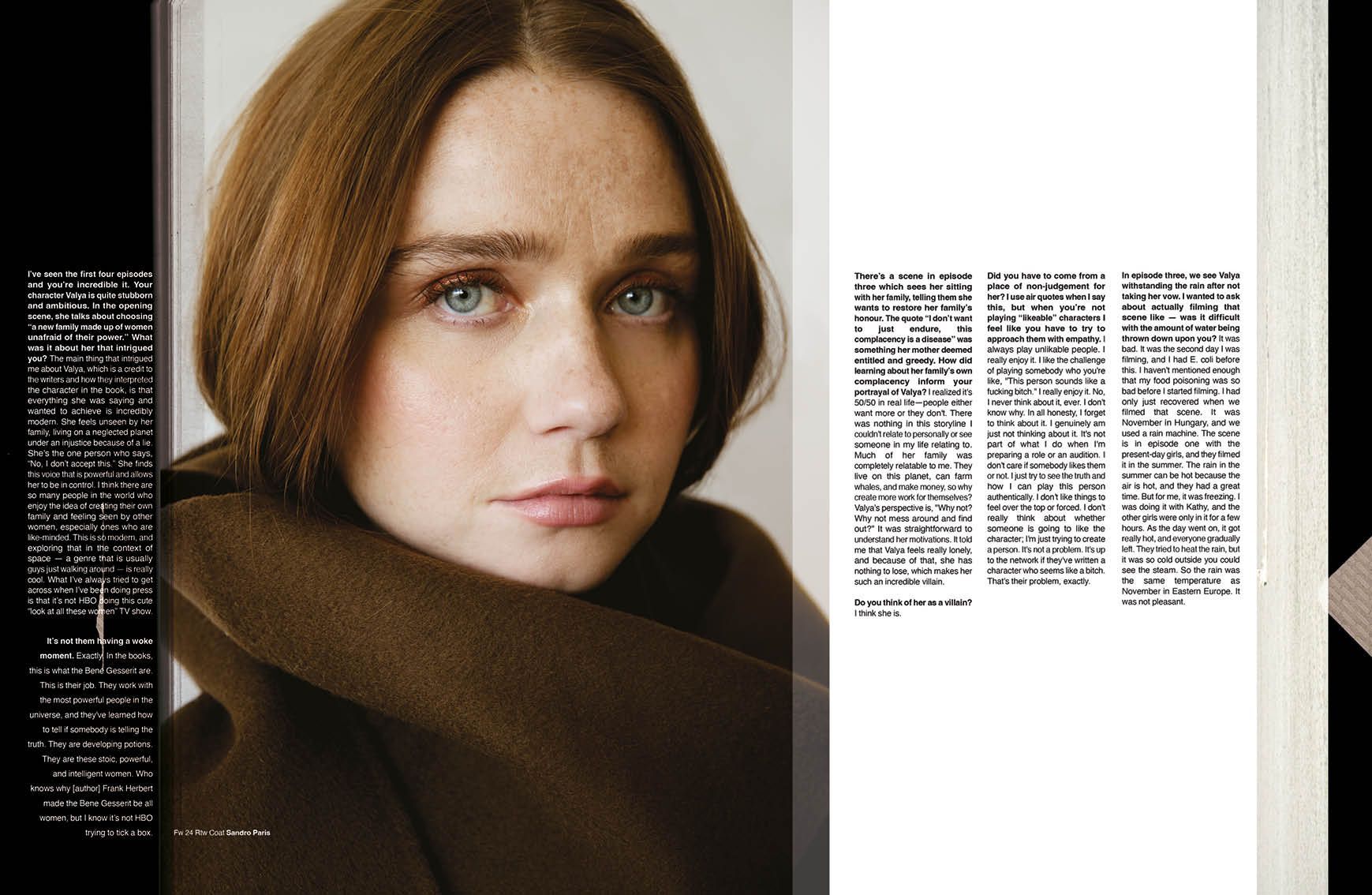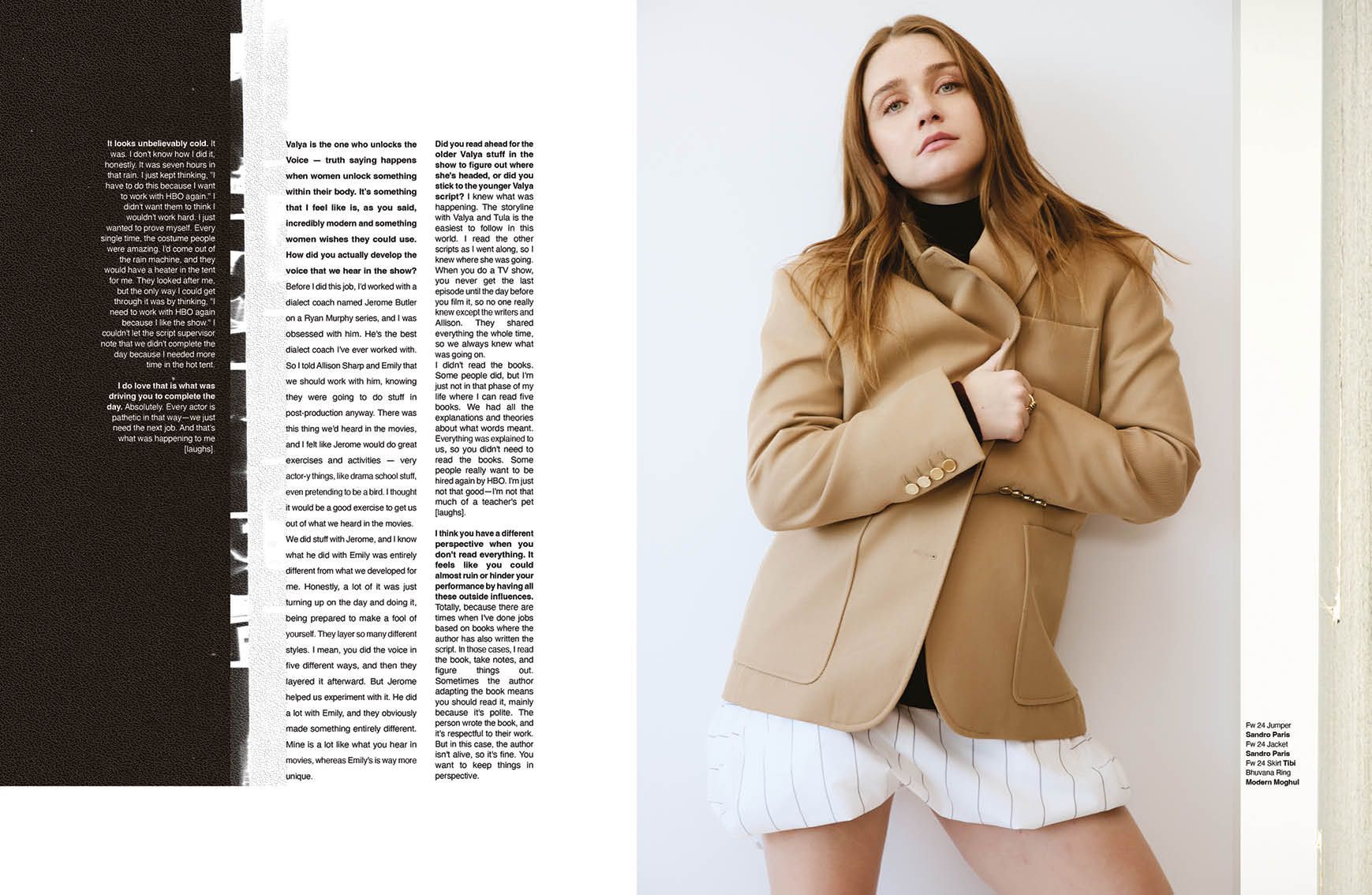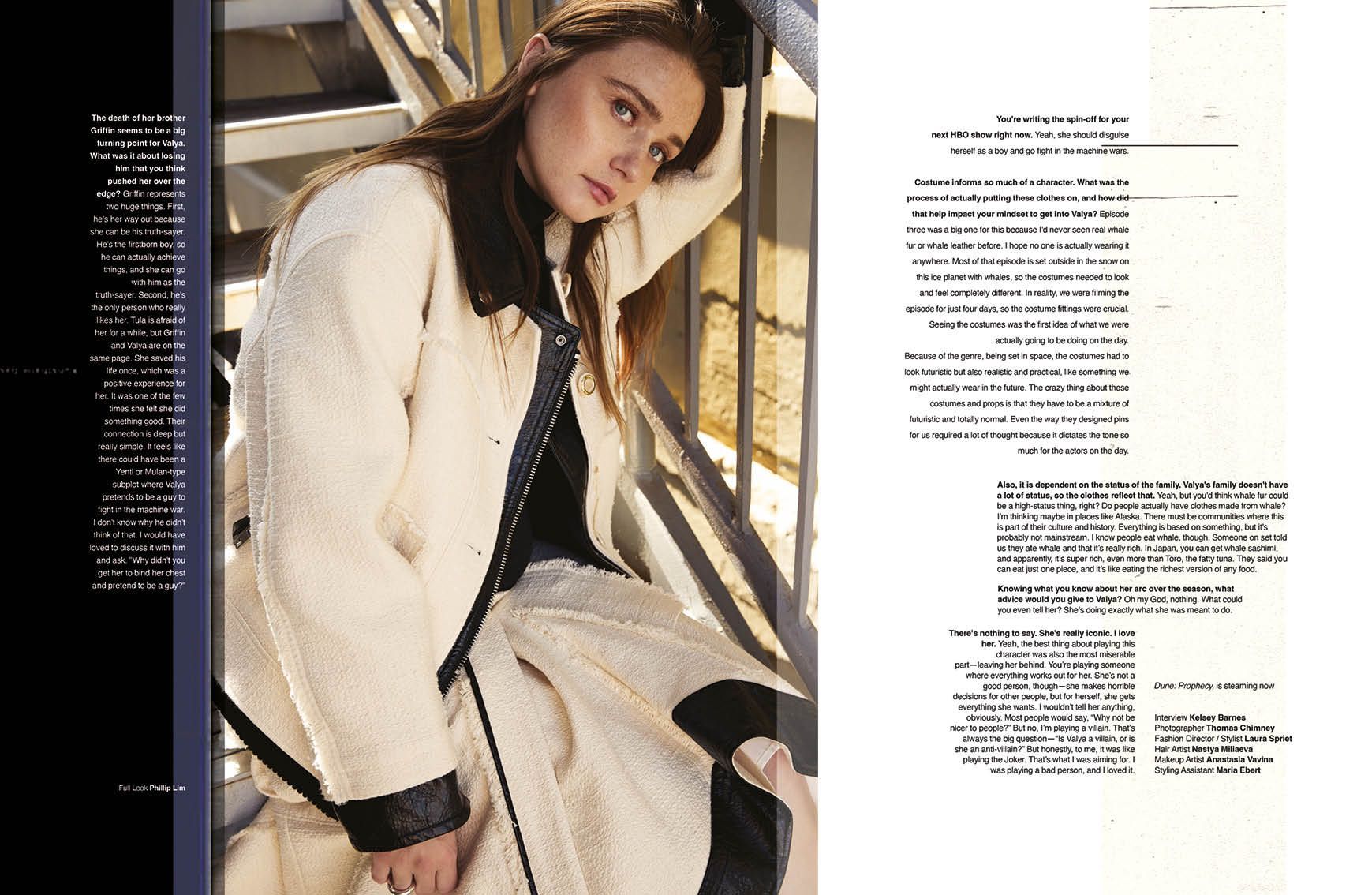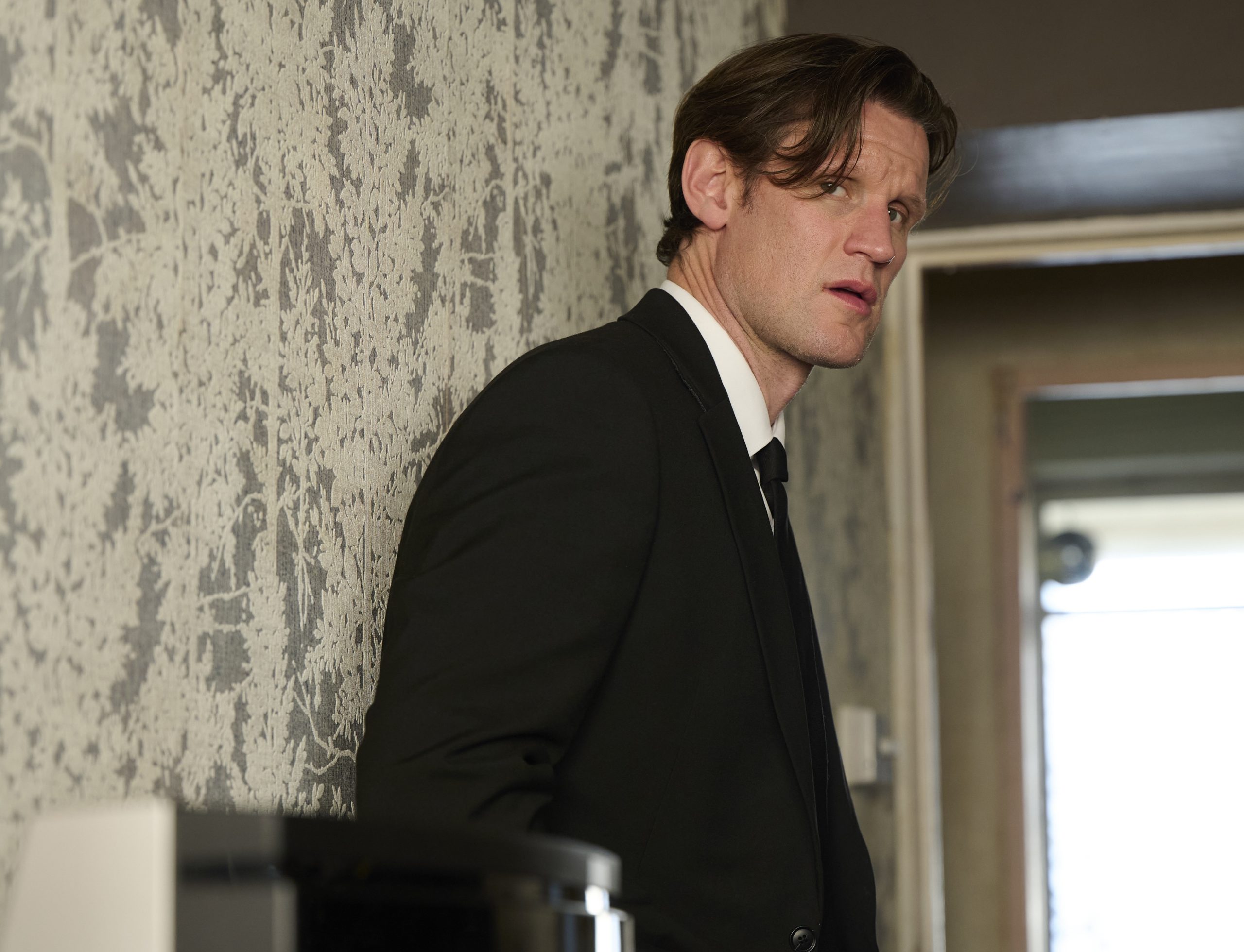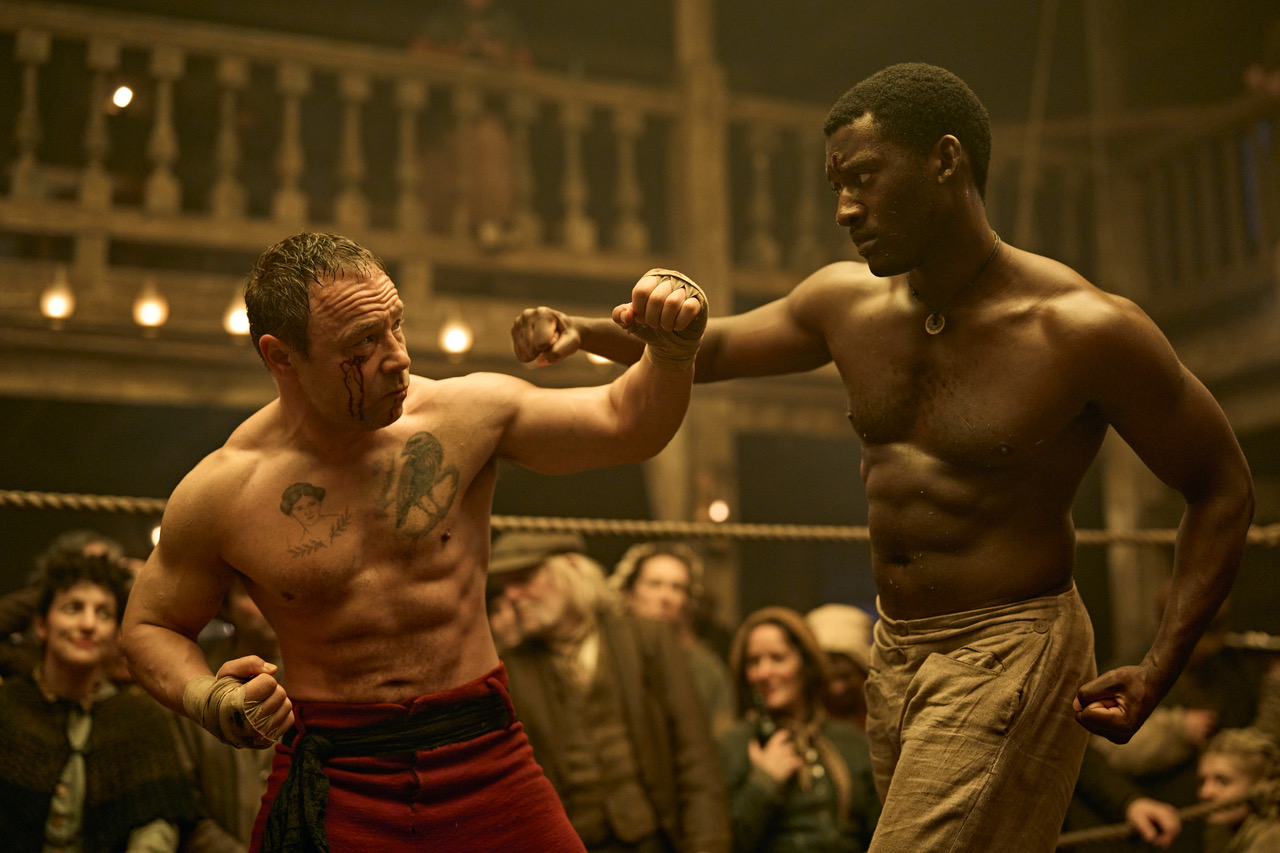Jessica Barden isn’t afraid of being the villain. Although she doesn’t exactly have the same cutthroat qualities her character — the stubborn, ambitious, and unwavering Valya Harkonnen — has in Dune: Prophecy, still, there are a few traits that clearly tie the two together. Barden has been in the business as a working actor since she was 10 and has seen the highs and lows of working for two decades in a fickle and fraught industry. At 32, she feels she has enough perspective — and experience — to understand her own growth and trajectory. Like Valya, she’s steadfast in her path and career, jumping from genre to genre & character to character in projects like The End of the F***ing World and The Lobster to push herself as an actress. Even though Barden is the first to say that actors, at times, can be overly grandiose about their craft, nothing about her captivating portrayal of the cunning Harkonnen feels like a pastiche of past villains. Barden’s Valya is truly incomparable.
In Dune: Prophecy, Barden gets a taste of a big-scale HBO production — the first, she says, in her career so far. Set 10,000 years before the events of Dune, the series follows sisters Valya and Tula Harkonnen as they battle forces endangering humanity’s future and lay the foundation for the legendary sect known as the Bene Gesserit. Barden portrays young Valya in flashbacks, sharing the role with the iconic Emily Watson who plays Mother Superior, the leader of the Sisterhood, in her later years. Even in flashbacks, Barden’s approach to Valya — someone who longs to enact revenge on the Atreides for House Harkonnen’s banishment — makes you both terrified and feel sympathetic towards the character, all while she sinisterly takes over the Sisterhood.
Speaking with 1883’s Kelsey Barnes, Jessica Barden opens up about her time filming Dune: Prophecy, what intrigued her about the Bene Gesserit, why motherhood has allowed her to feel liberated, and more.
Jessica! Have you had a good week?
Yeah, totally. The weeks are just flying by. Everyone I talk to says it’s so weird because Thanksgiving was really late this year. I’ve only experienced a few Thanksgivings, but now I’m used to the American schedule. It feels like Thanksgiving happened, and then it’s Christmas, and suddenly the year is over. It’s like January was just rainy forever in LA, then it was summer, summer, summer, and now we’re at the end of the year.
It feels like we just celebrated the new year, like 2023 turning into 2024, only a couple of months ago.
Exactly, it was so hot, I felt like I was dying in the heat, and now it’s the end of the year. Last New Year’s feels so recent. It’s crazy.
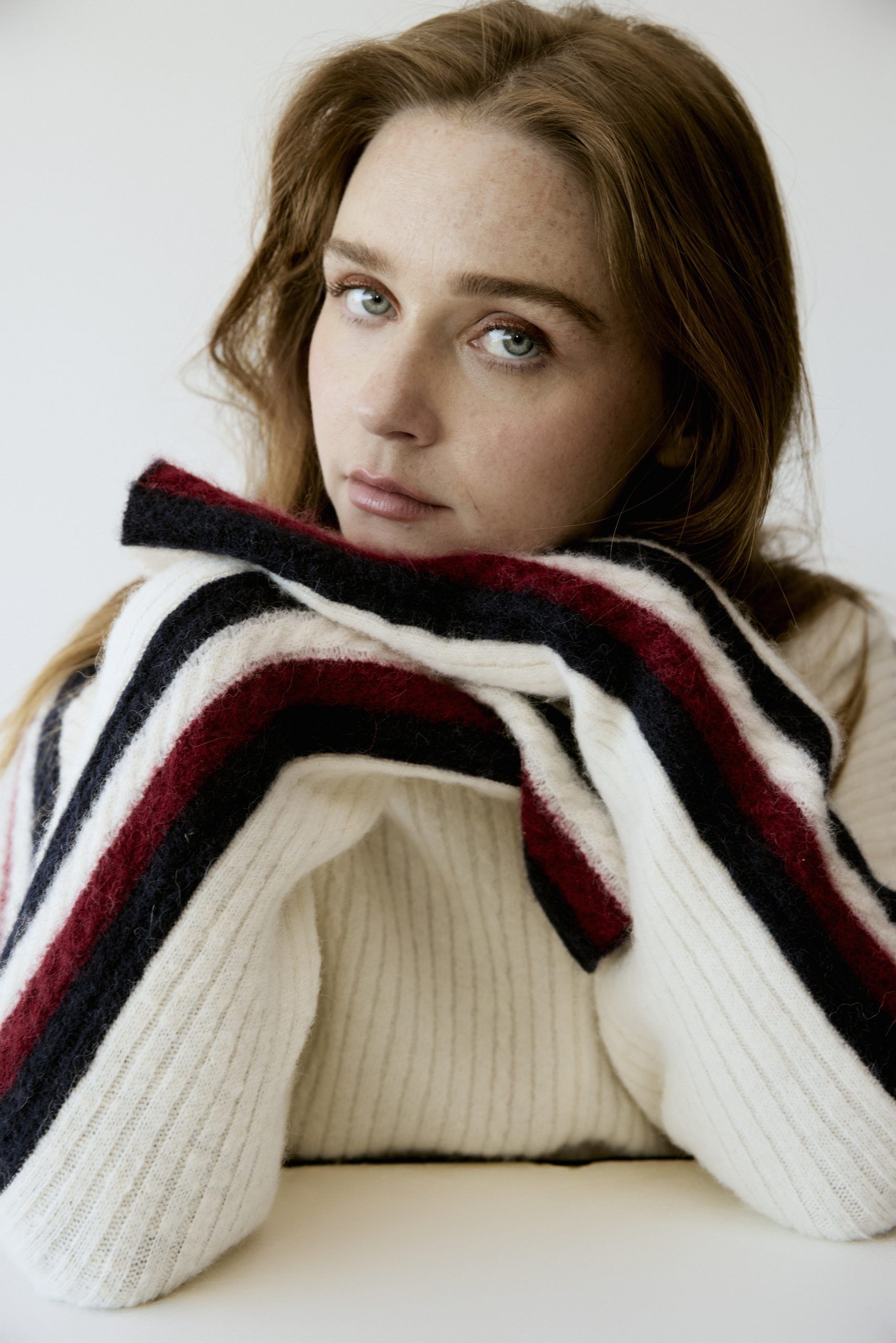
That’s what growing up feels like, realizing there’s never enough time. Did you film Dune: Prophecy this year or last year?
Last year. I was still filming around this time last year. I wrapped a few days before Christmas. I went in early November and filmed for about six or seven weeks. There were a lot of people I never met because they wrapped before I got there or were only in one episode.
It must be odd to go into a show and not meet everyone until the premiere.
It was the first time I experienced that. I’ve never done anything like this before, a huge ensemble show. This was so different from what I’ve been doing. It felt a bit weird at first, but then I just went with it. I loved making the show—it’s one of my favourite jobs I’ve ever done.
Was it daunting for you to step into such an ensemble project, given that Dune is a huge franchise?
No, no, because in the most positive, constructive way possible, I feel like I had already experienced pressure from audience expectations before. You experience it once and then you’re like, “I need to get a grip, no one is going to die if this TV show doesn’t work out.” I was also so overwhelmingly grateful that I was making something that was definitely going to be watched. I didn’t want to be nervous, I wanted to enjoy it. Historically, all the things I’ve done have been independent. I’ve been a lead or shared the lead with someone else. If it doesn’t work out, I’m fucked, you know? [Laughs] You feel like you’ve wasted someone’s money because it was independently produced. This time, someone else can take the blame [laughs]. It was refreshing to not have to accept any responsibility for it.
It must’ve been freeing to have that removed from your shoulders.
I probably experienced the opposite of what most people experience. I was somehow doing these jobs that had no expectation — they weren’t based on anything famous or there wasn’t a really famous person in it to give it a boost. A lot of them were still finding an audience. This was the first time I’ve done something with a budget, filming in a studio where the sets are built and they stay there rather than taking them down to build something new. I think a lot of people, especially now at the beginning of their careers, experience something like this [Dune] and that gives them their boost into the industry. I’ve done it differently. For me, by the time I’ve come to do something like Dune and I only have to do two scenes that day rather than a full day, it’s great [laughs]. I really enjoyed this — I’ve never had catering or trailers or any of that. I loved it.
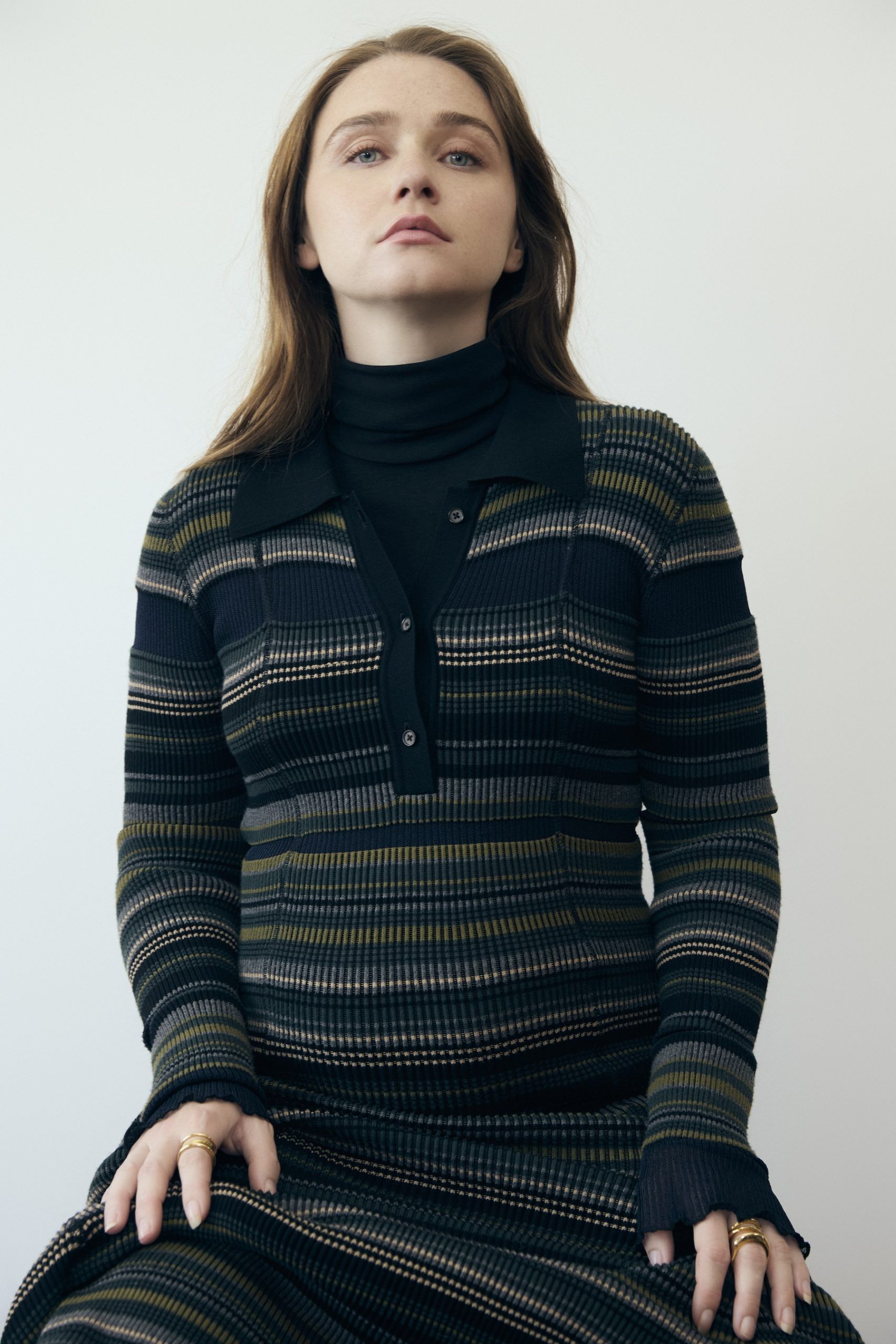
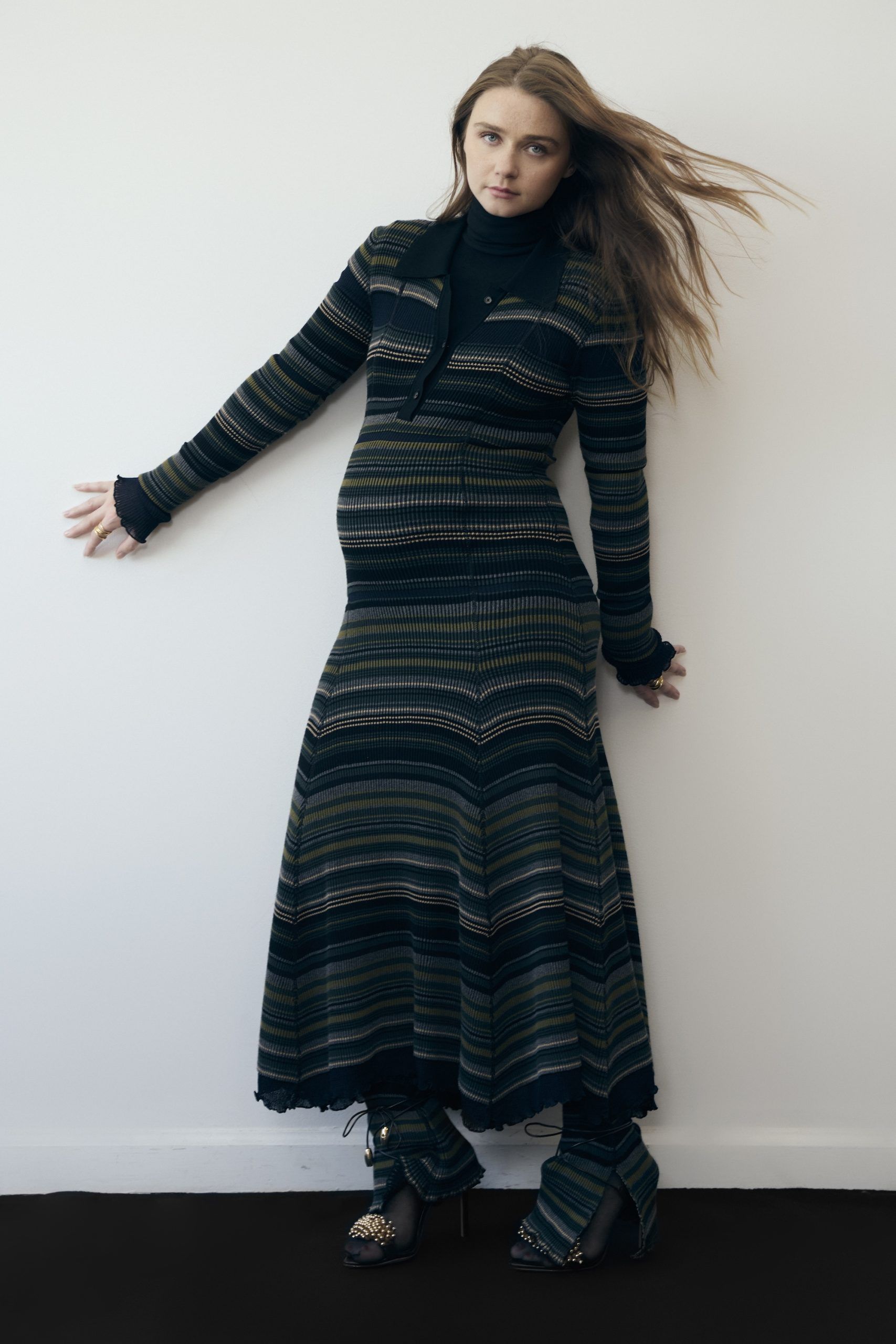

Is it strange to think you’ve been acting for over half of your life?
I know, I’m so old.
I just turned 32 so I feel you.
I turned 32 this year, I’m getting up there. I’ve been doing it for more than 15 years. I kind of started when I was seven, but I didn’t get a wage until I was 10 or 11. I’ve been a paid actor since I was 10.
Is your growth as an actor something you’re cognizant of as it’s happening or is it not something you can recognize until you have some distance between projects?
I think you have to be [aware of it]. The industry is so small in England, I’ll constantly work on things with people who have known me since I was 13. There’s been so many times where I’ve just completely fucked up every audition or years where I was completely un-castable. There were also years where I got every job I auditioned for. I’ve completely grown up doing it [acting] and, ultimately, that’s why I’m going through a phase where I feel really comfortable doing things like Dune: Prophecy. It all comes out in the wash anyway, as long as you don’t get cancelled [laughs]. All you have to do is be polite and you’re going to be fine.
Do you feel like turning 30 gave you peace of mind? I found that to be the case when I turned 30.
I know a big thing for me was having a kid. I had my first kid before I was 30 and it helped me a lot. I hear this with our age group. Sophie Turner said something the other day that resonated with me, it was about how, for our age group, we’re really good parents because we’ve kind of been fucked by the economy, the world, and the governments. We’ve always had terrorism, it’s been so fucking stressful. So, when we are having kids, it’s just so nice. It’s something that we’re really good at and it gives us perspective. It’s the first age-appropriate thing we can experience because none of us can afford a house. I live in LA and I can’t even afford a car [laughs]. Having kids has been really grounding, I just remember thinking that everything is fun because it’s not as serious as the other stuff. It’s just a genuinely fun addition to your life. It’s stressful — you have four hours of things you have to do during a 20-minute nap time — but it’s a good thing.
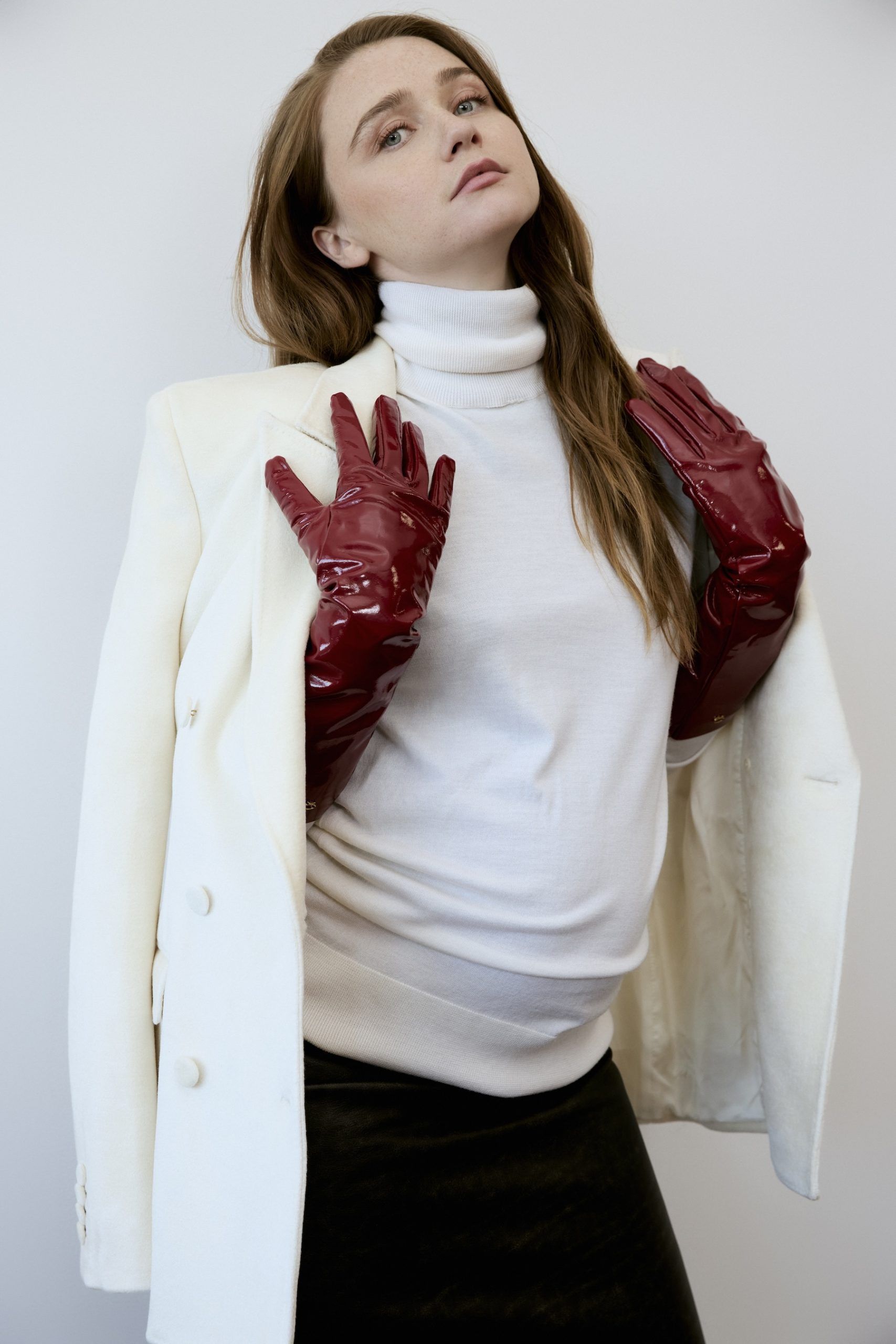
I read you discovered acting through school and your father’s love of film, so going back to your childhood: I wanted to ask if there was a specific fairytale, film, or book that made you want to get into this career of make-believe storytelling?
I was into all of it, my imagination was crazy. I remember watching Snow White which was the first movie that I saw in a theatre. It was amazing. All of the Disney movies were released around the time that we were kids. I loved Beauty and the Beast. I used to cry at it when they came down the stairs and met. I remember crying from being moved by the genuine romance of it and I was four. I also really love Jim Carrey and Robin Williams movies, I used to impersonate them. I didn’t have parents taking me to the opera or the theatre, I was watching Disney movies on my VHS and that had a really big effect on me. My brothers and I would learn the lines to the trailers before the movies on VHS, too [laughs]. It was magical to me, but it was very normal.
When you got the script for Dune: Prophecy, did you get that larger-than-life feeling when you were reading it?
I love Charlotte Rampling [Reverend Mother Gaius Helen Mohiam in Dune], I’ve worked with her son Barnaby Southcombe. I think she’s the coolest person ever and a great actor. I watched the Dune films and thought, “Those Bene Gesserit girls are the best,” and she’s the leader of them in the films. They aren’t really given a lot of screen time in the movie so that made them even more interesting to me.
When Dune: Prophecy was sent to me, I thought it was a dream job. Sharing a role with Emily [Watson] is crazy. I’ve worked with Olivia Williams before, and even though we didn’t have scenes together, I knew if she was attached it was going to be good. There was no red flag which doesn’t happen a lot. I couldn’t believe they asked me to do it — was there no one else available? [Laughs]
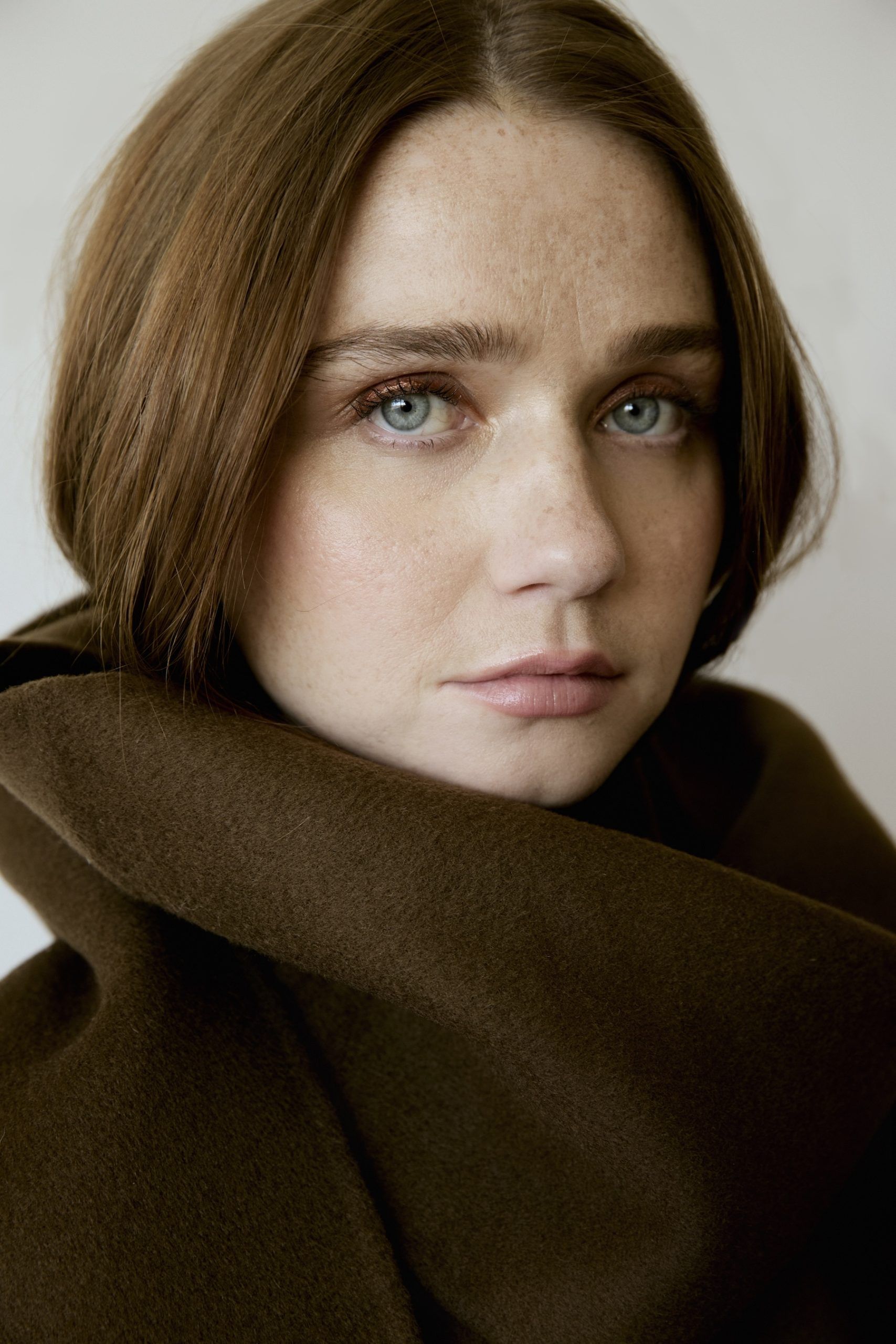
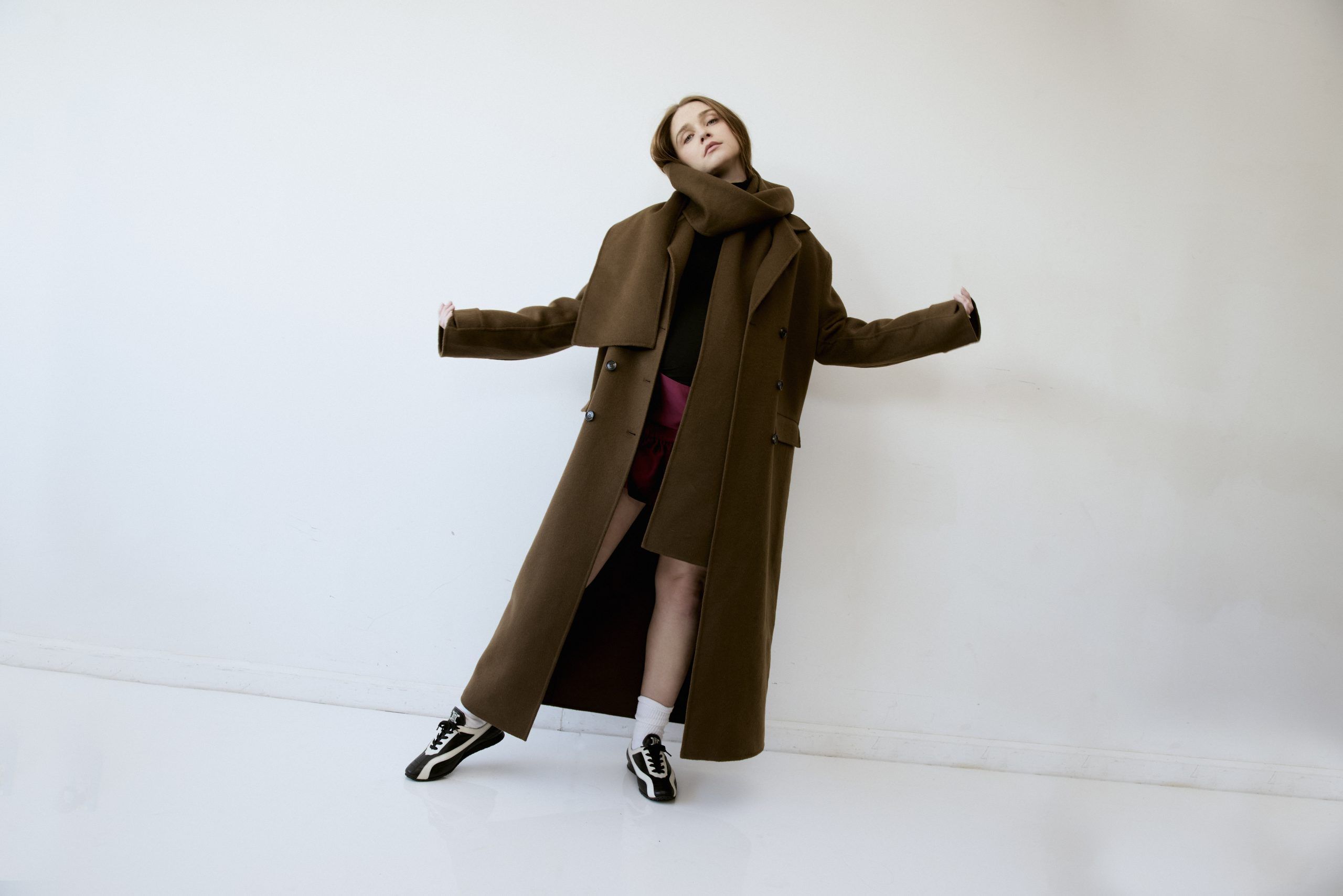
I’ve seen the first four episodes and you’re incredible it. Your character Valya is quite stubborn and ambitious. In the opening scene, she talks about choosing “a new family made up of women unafraid of their power.” What was it about her that intrigued you?
The main thing that intrigued me about Valya, which is a credit to the writers and how they interpreted the character in the book, is that everything she was saying and wanted to achieve is incredibly modern. She feels unseen by her family, living on a neglected planet under injustice because of a lie. She’s the one person who says, “No, I don’t accept this.” She finds this voice that is powerful and allows her to be in control. I think there are so many people in the world who enjoy the idea of creating their own family and feeling seen by other women, especially ones who are like-minded. This is so modern, and exploring that in the context of space — a genre that is usually guys just walking around — is really cool. What I’ve always tried to get across when I’ve been doing press is that it’s not HBO doing this cute “look at all these women” TV show.
It’s not them having a woke moment.
Exactly. In the books, this is what the Bene Gesserit are. This is their job. They work with the most powerful people in the universe, and they’ve learned how to tell if somebody is telling the truth. They are developing potions. They are these stoic, powerful, and intelligent women. Who knows why [author] Frank Herbert made the Bene Gesserit be all women, but I know it’s not HBO trying to tick a box.
There’s a scene in episode three which sees her sitting with her family, telling them she wants to restore her family’s honour. The quote “I don’t want to just endure, this complacency is a disease” was something her mother deemed entitled and greedy. How did learning about her family’s own complacency inform your portrayal of Valya?
I realized it’s 50/50 in real life—people either want more or they don’t. There was nothing in this storyline I couldn’t relate to personally or see someone in my life relating to. Much of her family was completely relatable to me. They live on this planet, can farm whales, and make money, so why create more work for themselves? Valya’s perspective is, “Why not? Why not mess around and find out?” It was straightforward to understand her motivations. It told me that Valya feels really lonely, and because of that, she has nothing to lose, which makes her such an incredible villain.
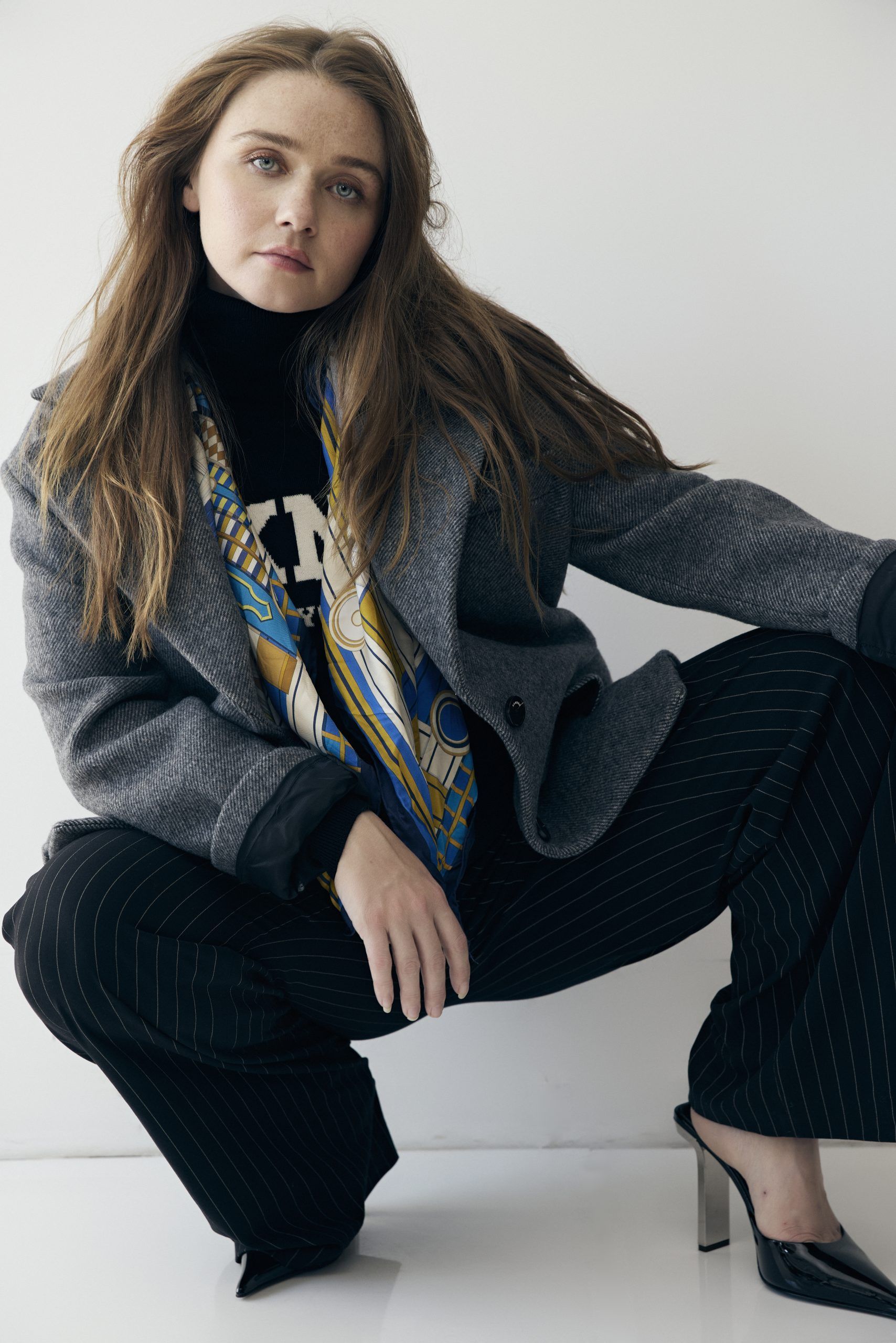
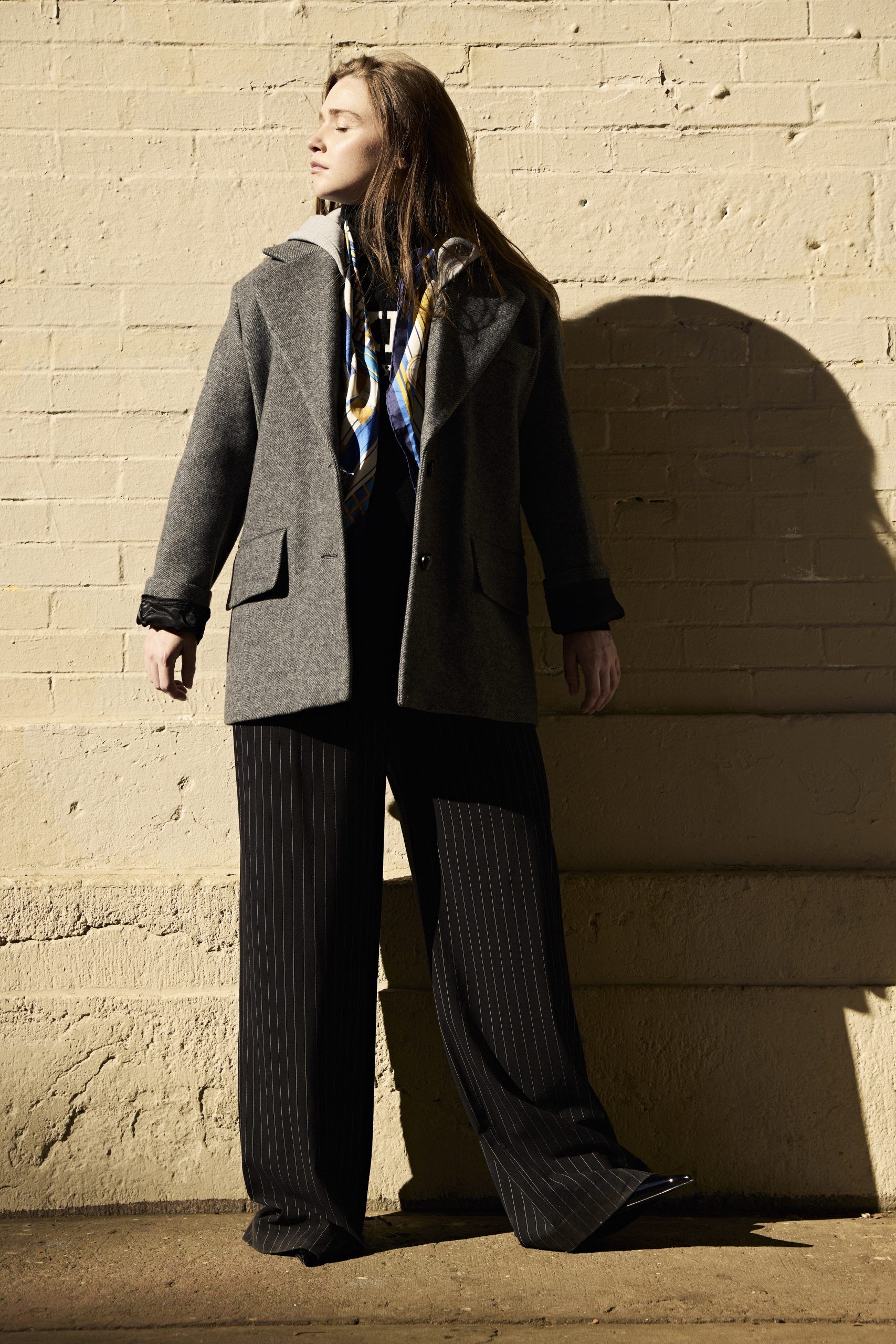
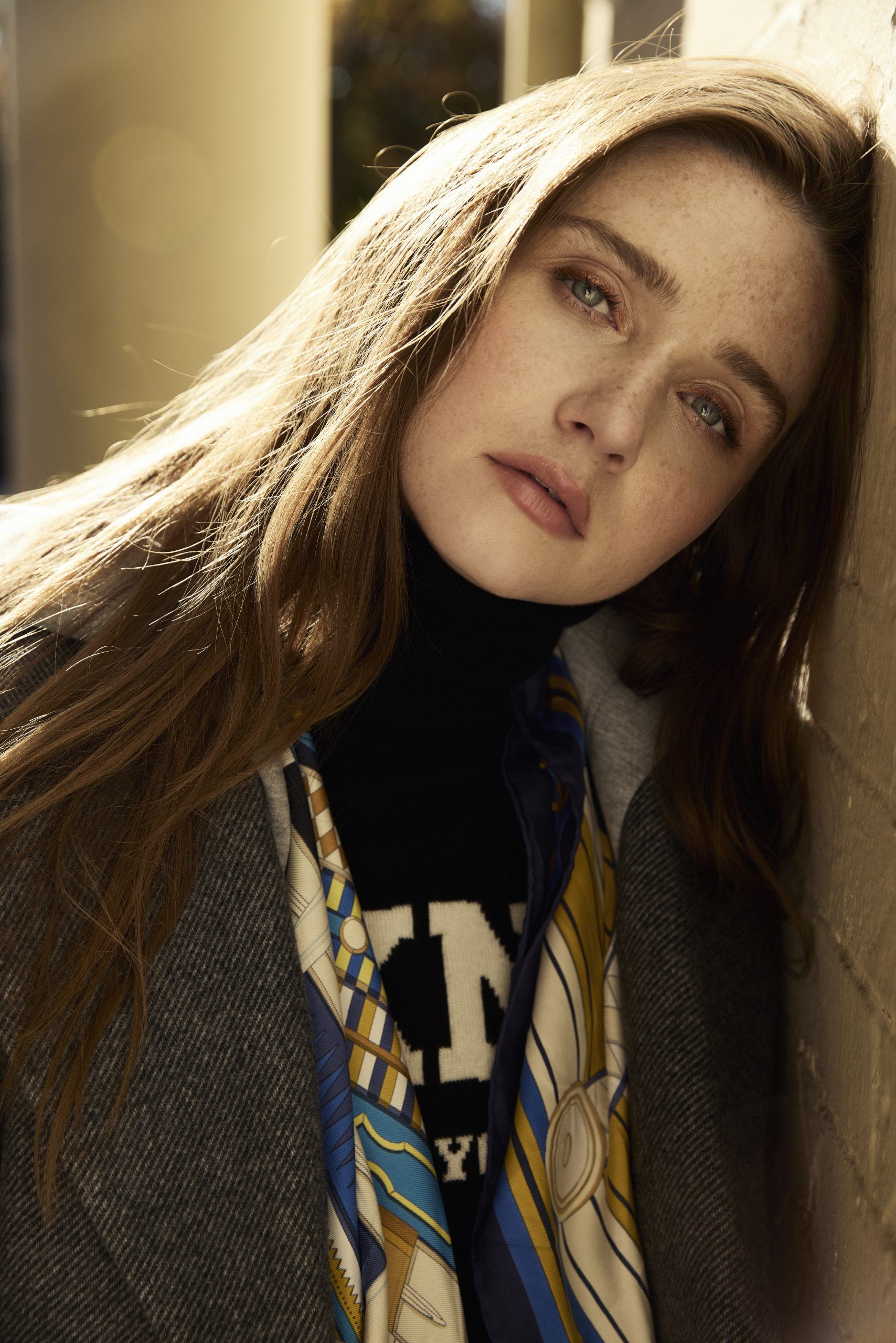
Do you think of her as a villain?
I think she is.
Did you have to come from a place of non-judgement for her? I use air quotes when I say this, but when you’re not playing “likeable” characters I feel like you have to try to approach them with empathy.
I always play unlikeable people. I really enjoy it. I like the challenge of playing somebody who you’re like, “This person sounds like a fucking bitch.” I really enjoy it. No, I never think about it, ever. I don’t know why. In all honesty, I forget to think about it. I genuinely am just not thinking about it. It’s not part of what I do when I’m preparing a role or an audition. I don’t care if somebody likes them or not. I just try to see the truth and how I can play this person authentically. I don’t like things to feel over the top or forced. I don’t really think about whether someone is going to like the character; I’m just trying to create a person. It’s not a problem. It’s up to the network if they’ve written a character who seems like a bitch. That’s their problem, exactly.
In episode three, we see Valya withstanding the rain after not taking her vow. I wanted to ask about actually filming that scene — was it difficult with the amount of water being thrown down upon you?
It was bad. It was the second day I was filming, and I had E. coli before this. I haven’t mentioned enough that my food poisoning was so bad before I started filming. I had only just recovered when we filmed that scene. It was November in Hungary, and we used a rain machine. The scene is in episode one with the present-day girls, and they filmed it in the summer. The rain in the summer can be hot because the air is hot, and they had a great time.
But for me, it was freezing. I was doing it with Kathy, and the other girls were only in it for a few hours. As the day went on, it got really hot, and everyone gradually left. They tried to heat the rain, but it was so cold outside you could see the steam. So the rain was the same temperature as November in Eastern Europe. It was not pleasant.
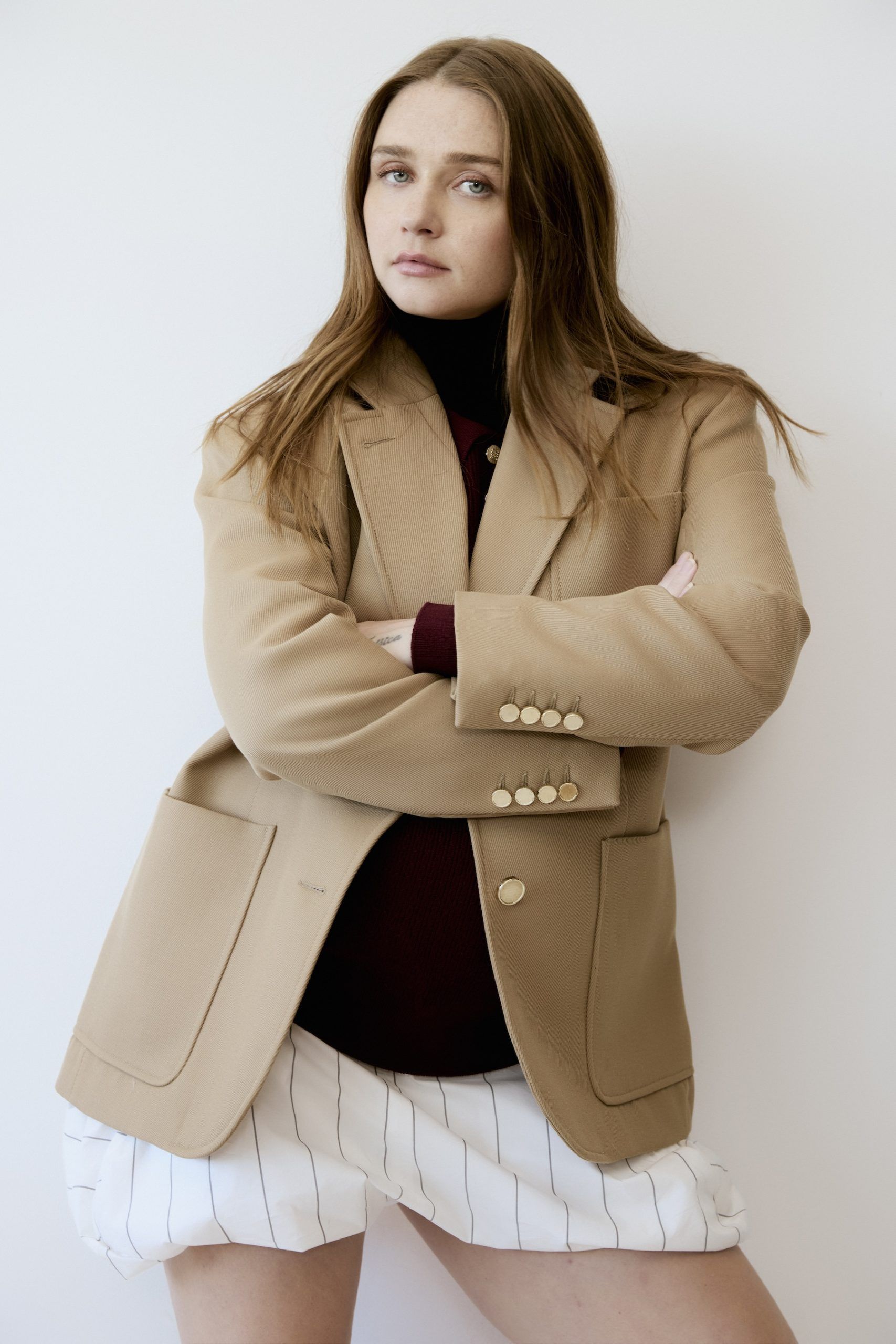
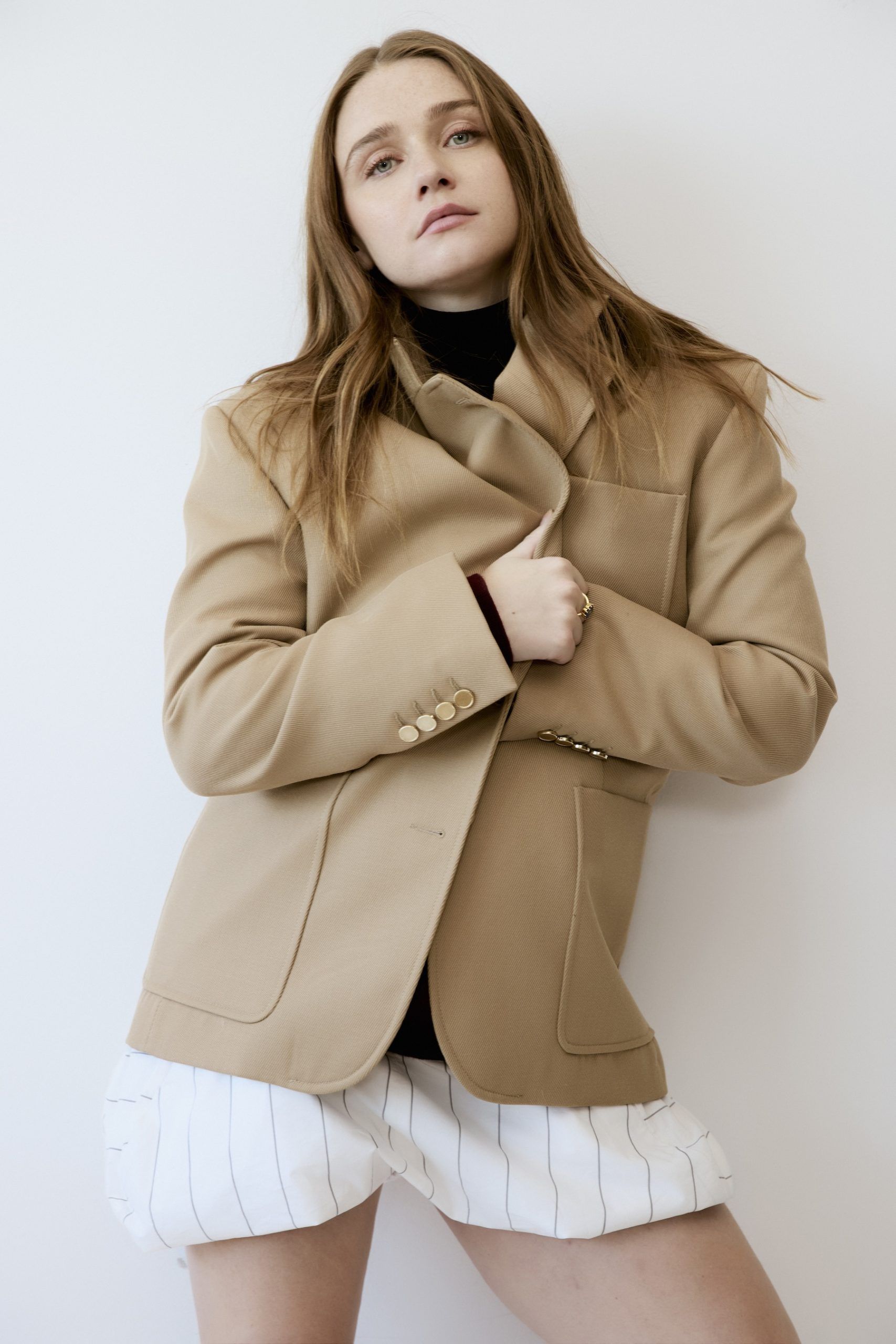
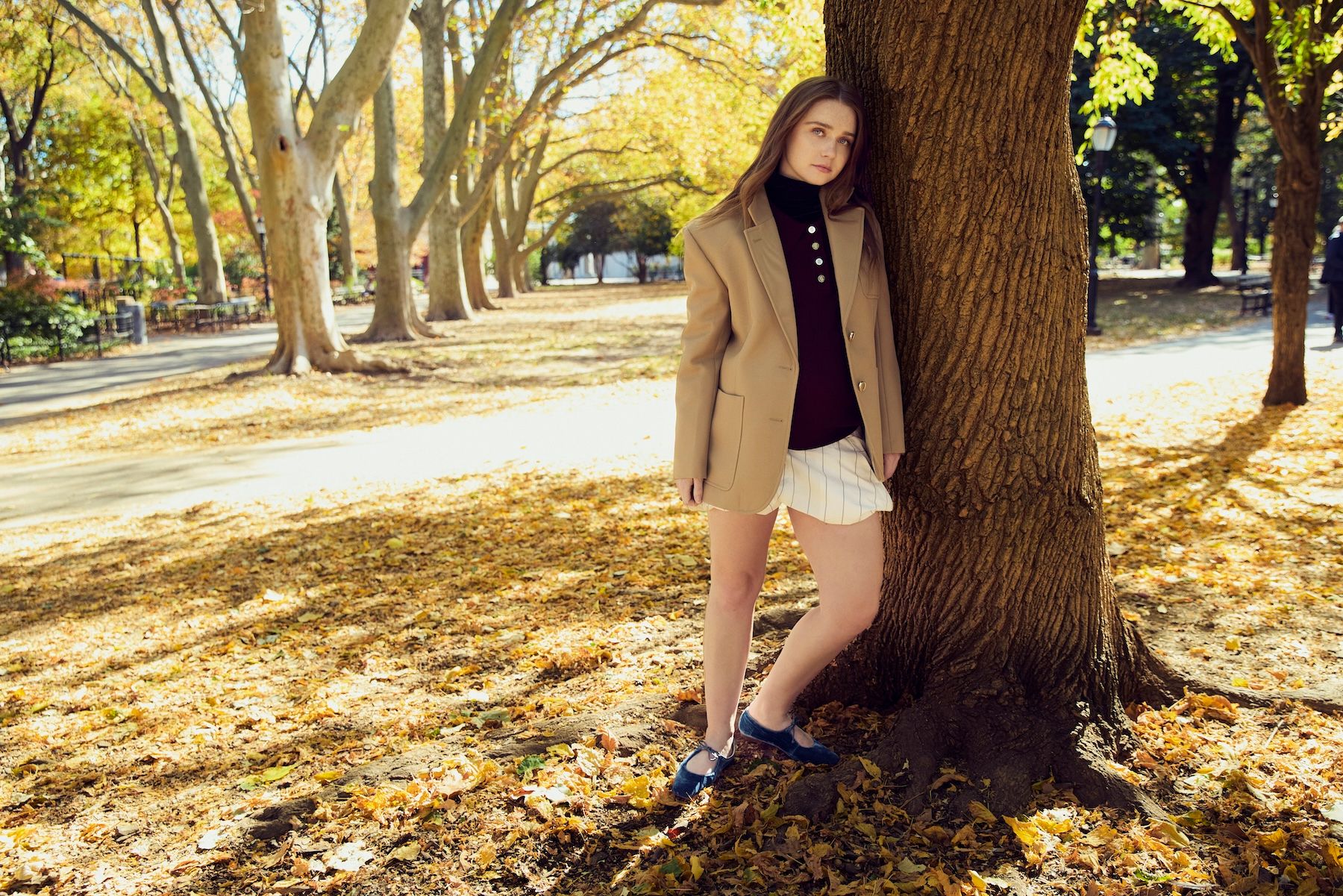
It looks unbelievably cold.
It was. I don’t know how I did it, honestly. It was seven hours in that rain. I just kept thinking, “I have to do this because I want to work with HBO again.” I didn’t want them to think I wouldn’t work hard. I just wanted to prove myself. Every single time, the costume people were amazing. I’d come out of the rain machine, and they would have a heater in the tent for me. They looked after me, but the only way I could get through it was by thinking, “I need to work with HBO again because I like the show.” I couldn’t let the script supervisor note that we didn’t complete the day because I needed more time in the hot tent.
I do love that is what was driving you to complete the day.
Absolutely. Every actor is pathetic in that way—we just need the next job. And that’s what was happening to me [laughs].
Valya is the one who unlocks the Voice — truth saying happens when women unlock something within their bodies. It’s something that I feel like is, as you said, incredibly modern and something women wish they could use. How did you actually develop the voice that we hear in the show?
Before I did this job, I’d worked with a dialect coach named Jerome Butler on a Ryan Murphy series, and I was obsessed with him. He’s the best dialect coach I’ve ever worked with. So I told Allison Sharp and Emily that we should work with him, knowing they were going to do stuff in post-production anyway. There was this thing we’d heard in the movies, and I felt like Jerome would do great exercises and activities — very actor-y things, like drama school stuff, even pretending to be a bird. I thought it would be a good exercise to get us out of what we heard in the movies.
We did stuff with Jerome, and I know what he did with Emily was entirely different from what we developed for me. Honestly, a lot of it was just turning up on the day and doing it, being prepared to make a fool of yourself. They layer so many different styles. I mean, you did the voice in five different ways, and then they layered it afterward. But Jerome helped us experiment with it. He did a lot with Emily, and they obviously made something entirely different. Mine is a lot like what you hear in movies, whereas Emily’s is way more unique.
Did you read ahead for the older Valya stuff in the show to figure out where she’s headed, or did you stick to the younger Valya script?
I knew what was happening. The storyline with Valya and Tula is the easiest to follow in this world. I read the other scripts as I went along, so I knew where she was going. When you do a TV show, you never get the last episode until the day before you film it, so no one really knew except the writers and Allison. They shared everything the whole time, so we always knew what was going on.
I didn’t read the books. Some people did, but I’m just not in that phase of my life where I can read five books. We had all the explanations and theories about what words meant. Everything was explained to us, so you didn’t need to read the books. Some people really want to be hired again by HBO. I’m just not that good—I’m not that much of a teacher’s pet [laughs].
I think you have a different perspective when you don’t read everything. It feels like you could almost ruin or hinder your performance by having all these outside influences.
Totally, because there are times when I’ve done jobs based on books where the author has also written the script. In those cases, I read the book, take notes, and figure things out. Sometimes the author adapting the book means you should read it, mainly because it’s polite. The person wrote the book, and it’s respectful to their work. But in this case, the author isn’t alive, so it’s fine. You want to keep things in perspective.
The death of her brother Griffin seems to be a big turning point for Valya. What was it about losing him that you think pushed her over the edge?
Griffin represents two huge things. First, he’s her way out because she can be his truth-sayer. He’s the firstborn boy, so he can actually achieve things, and she can go with him as the truth-sayer. Second, he’s the only person who really likes her. Tula is afraid of her for a while, but Griffin and Valya are on the same page. She saved his life once, which was a positive experience for her. It was one of the few times she felt she did something good. Their connection is deep but really simple. It feels like there could have been a Yentl or Mulan-type subplot where Valya pretends to be a guy to fight in the machine war.
I don’t know why he didn’t think of that. I would have loved to discuss it with him and ask, “Why didn’t you get her to bind her chest and pretend to be a guy?”
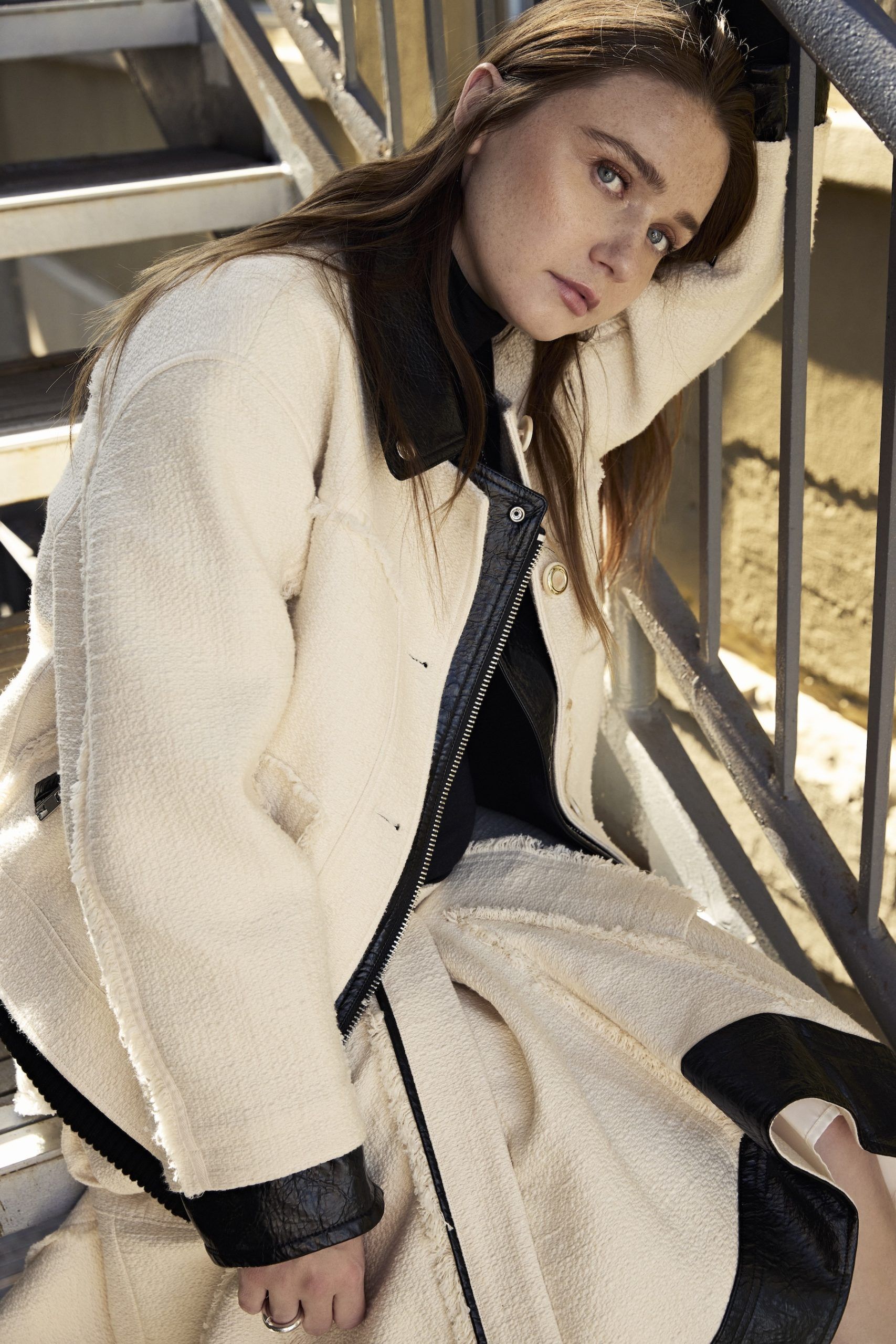
You’re writing the spin-off for your next HBO show right now.
Yeah, she should disguise herself as a boy and go fight in the machine wars.
Costume informs so much of a character. What was the process of actually putting these clothes on, and how did that help impact your mindset to get into Valya?
Episode three was a big one for this because I’d never seen real whale fur or whale leather before. I hope no one is actually wearing it anywhere. Most of that episode is set outside in the snow on this ice planet with whales, so the costumes needed to look and feel completely different. In reality, we were filming the episode for just four days, so the costume fittings were crucial. Seeing the costumes was the first idea of what we were actually going to be doing on the day.
Because of the genre, being set in space, the costumes had to look futuristic but also realistic and practical, like something we might actually wear in the future. The crazy thing about these costumes and props is that they have to be a mixture of futuristic and totally normal. Even the way they designed pins for us required a lot of thought because it dictated the tone so much for the actors on the day.
Also, it is dependent on the status of the family. Valya’s family doesn’t have a lot of status, so the clothes reflect that.
Yeah, but you’d think whale fur could be a high-status thing, right? Do people actually have clothes made from whale? I’m thinking maybe in places like Alaska. There must be communities where this is part of their culture and history. Everything is based on something, but it’s probably not mainstream. I know people eat whale, though. Someone on set told us they ate whale and that it’s really rich. In Japan, you can get whale sashimi, and apparently, it’s super rich, even more than Toro, the fatty tuna. They said you can eat just one piece, and it’s like eating the richest version of any food.
Knowing what you know about her arc over the season, what advice would you give to Valya?
Oh my God, nothing. What could you even tell her? She’s doing exactly what she was meant to do.
There’s nothing to say. She’s really iconic. I love her.
Yeah, the best thing about playing this character was also the most miserable part—leaving her behind. You’re playing someone where everything works out for her. She’s not a good person, though—she makes horrible decisions for other people, but for herself, she gets everything she wants. I wouldn’t tell her anything, obviously. Most people would say, “Why not be nicer to people?” But no, I’m playing a villain. That’s always the big question—“Is Valya a villain, or is she an anti-villain?” But honestly, to me, it was like playing the Joker. That’s what I was aiming for. I was playing a bad person, and I loved it.
Dune: Prophecy is airing now on HBO.
Interview Kelsey Barnes
Photography Thomas Chimney
Styling Laura Spriet
Hair Artist Nastya Miliaeva
Makeup Artist Anastasia Vavina
Styling Assistant Maria Ebert

